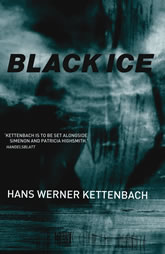The New Noir Comes from Europe: Hans Werner Kettenbach's Black Ice

One mystery of literary noir fiction is the why of it's disappearance in America after the mid-Sixties. The genre continued to have it's immense cultural impact upon Europe - we can't imagine the Nouvelle Vague or Italian post-war cinema or even the German New Wave without American noir literature. But except for Patricia Highsmith, the actual American writers of noir literature had all shut down most of their creative activity by the mid-Sixties.
Highsmith, of course, is precisely the writer who pointed the way out for noir literature. Certainly, a large part (but only a part) of noir's decline in the Sixties was due to the vast majority of white Americans moving out of the inner cities (noir's beloved environment) and into the suburbs, which made many of the noir trappings, plots and even philosophy implausible. It was Highsmith who was able to transcend noir's original inner urban setting and make suburban angst work for noir - see in particular Highsmith's The Cry of the Owl, but also her A Suspension of Mercy.
Few American writers have taken up Highsmith's clarion call, preferring to degenerate to the commonplace of today's mediocre mystery/crime genre scene. But we might expect that some Europeans might take up the challenge - and Hans Werner Kettenbach's Black Ice (originally published in German in 1981) is apparently merely the first of these to appear in English translation, from the spanking new publishing house Bitter Lemon Press.
Black Ice comes as a revelation as to what English-language crime fiction could be, and has now fallen so far short of. Taking place in one of the affluent small towns that cover Southern Germany, Kettenbach uses the mystery genre to begin to dissect such topics as class structure, the toxic nature of modern day office life, the dead-ending of careers and ambition and so much more. Kettenbach's stunning results of applying realism back into the mystery genre allow Black Ice to cut deeper, to be more truthful than any English-language crime novel from the past 30 or more years.
Read it.


0 Comments:
Post a Comment
<< Home